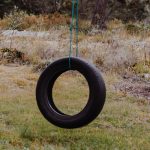We set up our tent in a campsite midway between the ocean and the salt marshes. Ecosystems crowd together on Assateague island, like a microcosm of the continent: saltwater and fresh, forest and desert. Feral, like the bands of wild ponies Ann hoped we’d see. The trip was her idea; the tent, hers also. I suspect she would camp alone if not for the unpredictability and possible danger of other people.
We coated our skin with mosquito repellent and made our way through the pines, emerging into a dry, sandy plain. Far enough from the ocean we couldn’t hear it, although you’re never very far from the ocean on a barrier island.
We should call it a rollover island. “Barrier island” sounds strong, immobile, like a fortification against the sea. In fact the sea pushes the island back toward the land, washing coastal sediment up and over the barrier flats. If you sped up time, the island would appear to be turning somersaults, and the nights that we spent there would be less than a blink.
We meandered, marveling at a grainy black rock that seemed to be surfacing from the sand. It looked volcanic, though that couldn’t be right. We followed it for lack of another clear path. Eventually the broken layers of rock coalesced into a smooth glittering stripe: a road. Nothing else nearby but sand, grass, mosquitos, and a historical marker: half a century ago, someone tried to lay a resort town here shortly before a hurricane rolled over the island.
We returned to camp before dusk. Unwrapped kabobs and laid them on the fire, played Scrabble in the purpling light. A half dozen wild ponies trotted through camp, snuffling at our sealed supplies and rolling languidly in the grass before they left. Out of earshot, a colossal force was reshaping the coastline with every tide, reaching its foamy fingers into the eroding shores. The rising sea, swollen with melted ice, surging into the tunnels and channels made for human aspirations.
Can you grieve for something you haven’t lost? One day the asphalt skeleton of the vanishing road will lie underneath the sandy soil we trod on, dissolving like clamshells into the sand. That is the nature of a barrier island: it moves on.
A blink in an island’s revolution. The ocean certainly will not grieve us.
[First published by Toho Journal, 2021]
…
Biography
Sara Davis is a recovering academic and marketing writer who lives in Philadelphia. Her PhD in American literature is from Temple University. She has recently published flash in Cleaver, Okay Donkey, and CRAFT. She currently blogs about books and climate anxiety at literarysara.net. Twitter: @LiterarySara
Image: unsplash.com





